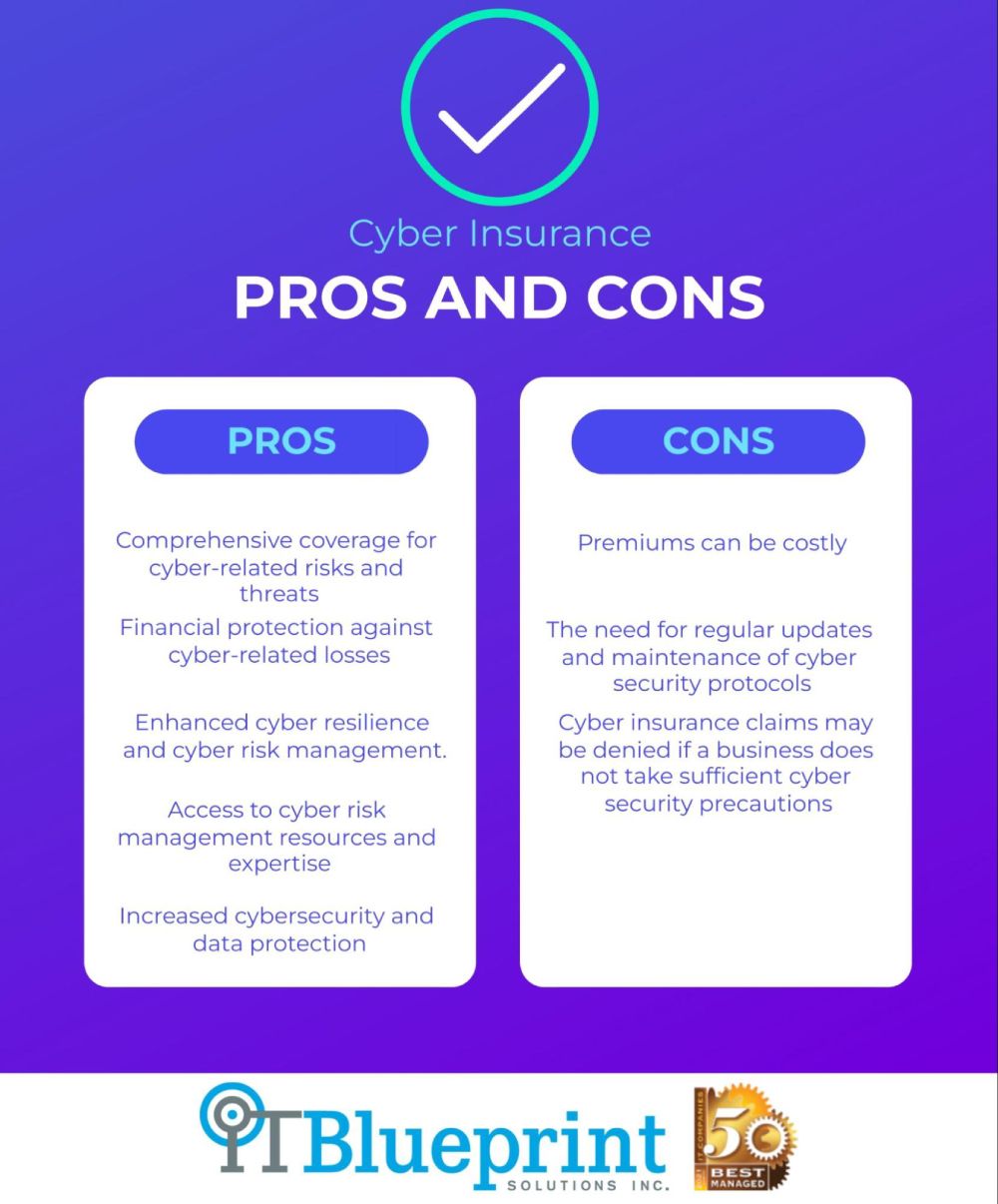Creating a cyber insurance coverage checklist can be a confusing and complex process, especially if you are new to the world of cyber insurance.
In order to find the best cyber insurance coverage for your needs, it is important to understand what cyber insurance covers, as well as the policy requirements that are associated with cyber insurance coverage.
There are several key factors that go into finding cyber insurance coverage that meets your needs. These include assessing the specific cyber security risks you face, knowing what is covered under your cyber insurance policy, and understanding any additional policy requirements or restrictions.
For example, some cyber insurance policies may require that you take certain steps to protect your data or maintain a certain level of cybersecurity in order to be eligible for coverage.
For more information on how to create a cyber insurance coverage checklist , we invite you to continue reading our blog.
What is Cyber Insurance and Why is it Important?
Cyber insurance is a type of coverage that helps protect businesses against cyber-related risks and losses.
These risks can include cyberattacks, data breaches , or other cyber incidents that could cause significant damage to a business’s reputation, financial stability, and overall success.
According to a report from Carbon Black , nearly 80% of businesses experienced at least one cyber incident in 2017, with 61% of those incidents being a cyber attack or security breach .
To ensure that your business is fully protected against cyber risks, it is important to work with an experienced cyber insurance broker who can help you understand the various policy requirements and determine the right coverage for your particular needs.
Are You Meeting ALL Your Cyber Insurance Policy Requirements?
Contact our cyber experts today to ensure your business remains protected.
5 Key Considerations for Cyber Insurance
At its core, cybersecurity insurance coverage is all about protecting your business from financial losses related to a ransomware attack , cyber incident , cyberattack, and data breach.
This can include things like covering the costs of recovery after an attack or compensating you for lost revenue if customers’ personal information has been compromised. Additionally, cyber insurance typically covers legal fees associated with defending yourself against a lawsuit in the event of a breach. Some additional key considerations to keep in mind are:
1. Knowing the Types of Cyber Insurance Coverages
Understand the different types of cyber coverage available, such as first-party coverage for direct losses related to a cyber incident and third-party liability coverage for losses resulting from cyber incidents that involve your customers or clients.
2. Identify Major Vulnerabilities and Threats
To accurately access risk management needs, identify the cyber risks specific to your business, such as cyberattacks, data breaches , malware infections, and ransomware attacks
3. Checking Current Cyber Security Standing
Evaluate your current cyber security practices and determine whether they are sufficient to minimize cyber risks and minimize your exposure to cyber insurance claims. Consider engaging a cyber security consultant if needed.
4. Professional Cyber Insurance Consulting
Work with an experienced cybersecurity IT company who can help you understand the different policy requirements and choose the right coverage for your particular needs.
5. The Cost of Not Being Proactive
Be sure to purchase cyber insurance well in advance of any potential cyber incident so that you have time to review any available coverage options and make changes as needed before a claim is made or potential loss occurs.
What are 5 Benefits of Having Cyber Insurance?
When looking for comprehensive cyber insurance coverage, it is important to work with a broker who understands the cyber risks facing businesses today and can help you:
- Evaluate your current cyber security practices
- Identify the right coverage options for your business
- Purchase insurance well in advance of any potential cyber incident
With the right cyber insurance policy in place, you can rest assured that your business is fully protected against cyber-related risks and losses. Additional benefits you stand to gain from cyber insurance includes:
1. Protection Against Cyberattacks and Data Breaches: Cyber insurance can help cover the costs associated with cyberattacks and data breaches , including the costs of:
-
- Notifying affected parties
- Conducting forensic investigations
- Implementing or updating cyber security measures
- Responding to regulatory inquiries, and repairing damaged computer systems
2. Coverage for Business interruption Losses – Cyber insurance can also help protect your business against financial losses resulting from downtime or service disruptions caused by cyber incidents.
3. Reduction of Cyber Risks and Liability – By investing in cyber insurance, businesses can take an important step towards reducing their overall cyber risks and liability exposure. This can help minimize the potential impact of a cyber incident on the company’s bottom line as well as improve its standing with customers and partners.
4. Peace of Mind – As cyber risks continue to evolve and become more widespread, cyber insurance can provide businesses with peace of mind by helping to mitigate the financial impact of cyber incidents and protect against potentially devastating losses.
5. Tax Benefits – In some cases, cyber insurance may also be eligible for tax benefits such as deductions or exclusions related to data breach notification costs.

4 Cyber Insurance Policy Requirements Every Checklist Needs
Cyber attacks and data breaches are growing in frequency and sophistication.
According to a recent study by the Ponemon Institute, cyberattacks cause an average of $7.7 million in financial losses for large businesses , and that over 70% of companies surveyed had to deal with at least two cyber incidents over the course of a year.
Given the serious threats that businesses face, it’s essential that all policy requirements are achieved and maintained through the term of cyber liability insurance . Among the four general policy requirements every cyber insurance coverage checklist needs include:
- Pre-Inspection of Cyber Security Systems – Prior to purchasing cyber insurance, businesses will typically need to complete a pre-inspection of their cyber security systems and practices to assess the adequacy of their current protections.
- Policy Limits and Deductibles – In addition, cyber insurance policies often have specific policy limits, deductibles, and requirements for how claims must be reported.
- Understanding Cyber Insurance Coverage Options – To ensure that you are getting the right coverage for your business needs, it is also important to work with an experienced broker who can help you understand the different cyber insurance coverage options available, as well as any policy requirements or limitations that may apply.
- Perform Routine Cyber Risk Assessments – Finally, in order to maintain effective cyber insurance coverage over time, businesses will typically need to undergo regular cyber risk assessments and stay up-to-date on cyber risks and security trends.
With the right cyber insurance policy in place, your business can rest assured that it is fully protected against the ever-evolving cyber threats of today. Additional requirements for cyber insurance sometimes enforced include:
- Multi-factor authentication
- Step-by-step crisis management playbook
- Endpoint detection and response (EDR) services
Why Do Businesses Need Cyber Insurance Coverage?
There are many valuable benefits to having a cyber insurance coverage checklist for your business, including reduction of cyber risks and liability exposure and peace of mind knowing that your business is well-prepared to handle potential cyber incidents.
Additional reasons why business invest in cyber insurance coverage would be:
Improved Data Protection Measures – One of the most critical benefits of cyber insurance is that it provides businesses with sensitive data protection against cyberattacks and data breaches , which are some of the most common and costly cyber incidents faced by companies today.
Coverage for Business Interruption Losses – In addition, cyber insurance coverage can often help businesses recover from lost revenue or other financial losses resulting from cyber incidents, such as business interruption due to a shutdown or temporary suspension of operations.
Reduction of Cyber Risks and Liability Exposure – By taking steps to mitigate their cyber risks and liabilities, businesses can also reduce their need for cyber insurance coverage over time. However, in order to fully protect themselves against these threats, they typically need to work with an MSP who can help them select the appropriate cyber insurance policy.
For information on more related topics, please visit the following related blogs: |
Create a Complete Cyber Insurance Coverage Checklist Today
Cyber insurance coverage is an essential tool that businesses can use to protect themselves against the various cyber risks and liabilities they face in today’s digital landscape.
With the right policy in place, your business can rest assured that it is well-prepared to handle any cyber incidents that may arise.
Whether you are a large multinational corporation or a small business just starting out, cyber insurance cover support is an essential tool for protecting your organization against cyber risks and liabilities.
By providing protection against cyber attacks, data breaches , business interruption losses, and other cyber incidents, cyber insurance can help businesses recover from the financial and reputational impacts of cyber incidents and minimize their need for cyber risk mitigation measures over time.
To learn more about cyber insurance coverage and how it can protect your business , consult with our IT experts today.





